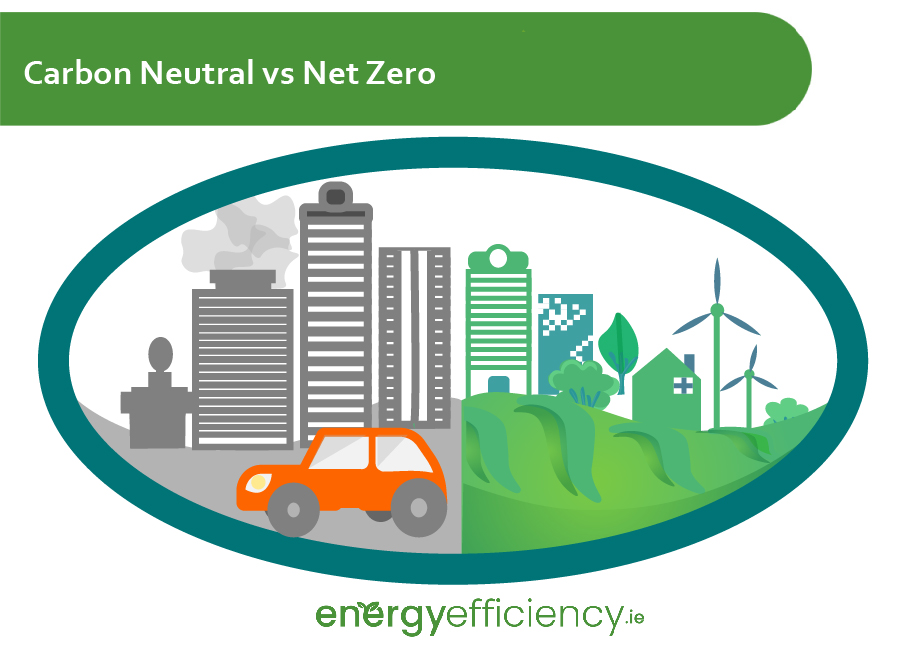Make your Business Carbon Neutral

Written by: Michael Malone
Published: November 10, 2023
Last updated: October 19, 2025
Reading time: 3 mins
Businesses across Ireland and around the world are becoming more aware of the environmental impact of their actions, and how they are positively or negatively contributing to Earth’s changing climate.
Solar panels for business grants and other incentives for eco-friendly practices have meant that many are now taking steps to reduce their overall carbon footprint, moving towards becoming carbon neutral.
Many businesses have taken steps to become carbon neutral as a green business model could actually also improve processes and reduce overall costs.
What is a carbon neutral business?
A business is considered carbon neutral when the emissions produced by the business are equal to the emissions avoided or removed from the atmosphere.
Carbon emissions are carbon compounds such as CO2 and methane which are released into the atmosphere, often through activities such as burning fossil fuels such as coal or gas.
Businesses which don’t take steps to offset their carbon footprint are responsible for many of these emissions being released into the atmosphere, so it is important to know their causes and the steps that can be taken to minimise their effects.

Common Causes of Pollution for Small Businesses
It is estimated that small businesses contribute a significant proportion of global pollution through their daily practices.
Energy consumption is one of the main ways small businesses have a negative impact on the environment, as almost every business needs electricity for heat and lighting at the very least.
Electricity generated through the burning of fossil fuels has a detrimental effect on the environment, and greatly increases a business’ carbon footprint. Moving to green energy sources such as photovoltaic (PV) solar panels can therefore be a great way of moving towards carbon neutrality.
Petrol and diesel powered vehicles are also a leading cause of greenhouse gases being released into the atmosphere.
Businesses looking to offset their carbon emissions should consider electric vehicles (EVs), which have a much smaller impact on emissions, especially combined with renewable energy.
Single use plastics and wasted paper are another unnecessary pollutant, and many businesses have already taken steps to remove them.
Simple, cost-effective steps such as purchasing reusable cups and digitizing the workplace will greatly reduce the amount of plastic and paper a company needs.
Benefits of Going Carbon Neutral
It is no secret that customers prefer businesses that take care of the local environment and the planet in general. Many customers would even pay more for goods and services from a company with a track record of offsetting their carbon footprint, meaning not only is it an extremely positive strep to make for the future of the planet, it also makes good business sense.
Implementing measures which reduce the amount of emissions a business is responsible for is also cost-effective, as many of the ways of becoming carbon neutral (i.e, solar panels) will also save the company money in the long term.
And if those reasons are not enough, future climate focused regulations and laws could be on the way anyway, as countries attempt to achieve Net Zero in the coming decades.

Ways to become carbon neutral
Solar Panels
Solar panels are a great way — and possibly the simplest way – of reducing a business’ carbon emissions. They convert free, renewable energy from the sun each day into AC electricity which can be used to power all the appliances in many businesses. They also have a payback period of less than a decade, so not only will solar panels help you achieve carbon neutrality, they will also save you on annual energy bills.
Electric vehicles
Electric vehicles are another great and relatively simple way of making your business more green. These vehicles don’t require petrol or diesel to run, meaning that clean energy from solar panels can be used to power them, greatly reducing the amount of emissions your company is responsible for.
Considering different materials.
Considering different materials can also help reduce the amount of pollution a business produces. Choosing digital spreadsheets over paper, wood over concrete and recycled materials over new materials are just some of the ways to make a positive impact.
Steps to Make your Business Carbon Neutral
Measure and Define your Target
To measure your carbon footprint, you can use a commercial carbon footprint calculator that factors in things like your business’s electricity usage, company vehicle mileage, and shipping costs. This is essential because understanding your business’ carbon footprint is necessary in order to create a sustainable and workable plan.
Specific data will be needed to make these measurements such as the total kWh of electricity used, the amount of waste, flights, and km travelled by your fleet.
These activities are then multiplied by their associated emissions factor to calculate the volume of emissions produced by that activity.
Create a Carbon Neutral Plan
There are different ways of meeting your carbon neutrality goal. One way is to ‘offset’ your way to carbon neutrality without even reducing your organisation’s own emissions.
This is quick and simple, and may not even necessarily expensive, however it does not improve your business performance though. Buying these offsets annually also adds extra costs to your business. So taking steps to reduce your business’ carbon emissions is more sustainable going forward.
Carbon Neutral vs Net Zero
Carbon neutrality is a short-term goal for many businesses as they aim to reach net-zero. So what is the difference?
To achieve net-zero, a business must reduce or avoid the majority of its emissions within a specific period of time. These reductions, such as going solar or buying a fleet of electric vehicles will greatly reduce the amount of carbon credits needed to be carbon neutral. At net-zero, only unavoidable carbon emissions will need to be compensated for with carbon credits.

Make your Business Carbon Neutral
Published: November 10, 2023
Last updated: October 19, 2025

Written by: Michael Malone
Reading time: 3mins
Businesses across Ireland and around the world are becoming more aware of the environmental impact of their actions, and how they are positively or negatively contributing to Earth’s changing climate.
Solar panels for business grants and other incentives for eco-friendly practices have meant that many are now taking steps to reduce their overall carbon footprint, moving towards becoming carbon neutral.
Many businesses have taken steps to become carbon neutral as a green business model could actually also improve processes and reduce overall costs.
What is a carbon neutral business?
A business is considered carbon neutral when the emissions produced by the business are equal to the emissions avoided or removed from the atmosphere.
Carbon emissions are carbon compounds such as CO2 and methane which are released into the atmosphere, often through activities such as burning fossil fuels such as coal or gas.
Businesses which don’t take steps to offset their carbon footprint are responsible for many of these emissions being released into the atmosphere, so it is important to know their causes and the steps that can be taken to minimise their effects.

Common Causes of Pollution for Small Businesses
It is estimated that small businesses contribute a significant proportion of global pollution through their daily practices.
Energy consumption is one of the main ways small businesses have a negative impact on the environment, as almost every business needs electricity for heat and lighting at the very least.
Electricity generated through the burning of fossil fuels has a detrimental effect on the environment, and greatly increases a business’ carbon footprint. Moving to green energy sources such as photovoltaic (PV) solar panels can therefore be a great way of moving towards carbon neutrality.
Petrol and diesel powered vehicles are also a leading cause of greenhouse gases being released into the atmosphere.
Businesses looking to offset their carbon emissions should consider electric vehicles (EVs), which have a much smaller impact on emissions, especially combined with renewable energy.
Single use plastics and wasted paper are another unnecessary pollutant, and many businesses have already taken steps to remove them.
Simple, cost-effective steps such as purchasing reusable cups and digitizing the workplace will greatly reduce the amount of plastic and paper a company needs.
Benefits of Going Carbon Neutral
It is no secret that customers prefer businesses that take care of the local environment and the planet in general. Many customers would even pay more for goods and services from a company with a track record of offsetting their carbon footprint, meaning not only is it an extremely positive strep to make for the future of the planet, it also makes good business sense.
Implementing measures which reduce the amount of emissions a business is responsible for is also cost-effective, as many of the ways of becoming carbon neutral (i.e, solar panels) will also save the company money in the long term.
And if those reasons are not enough, future climate focused regulations and laws could be on the way anyway, as countries attempt to achieve Net Zero in the coming decades.

Ways to become carbon neutral
Solar Panels
Solar panels are a great way — and possibly the simplest way – of reducing a business’ carbon emissions. They convert free, renewable energy from the sun each day into AC electricity which can be used to power all the appliances in many businesses. They also have a payback period of less than a decade, so not only will solar panels help you achieve carbon neutrality, they will also save you on annual energy bills.
Electric vehicles
Electric vehicles are another great and relatively simple way of making your business more green. These vehicles don’t require petrol or diesel to run, meaning that clean energy from solar panels can be used to power them, greatly reducing the amount of emissions your company is responsible for.
Considering different materials.
Considering different materials can also help reduce the amount of pollution a business produces. Choosing digital spreadsheets over paper, wood over concrete and recycled materials over new materials are just some of the ways to make a positive impact.
Steps to Make your Business Carbon Neutral
Measure and Define your Target
To measure your carbon footprint, you can use a commercial carbon footprint calculator that factors in things like your business’s electricity usage, company vehicle mileage, and shipping costs. This is essential because understanding your business’ carbon footprint is necessary in order to create a sustainable and workable plan.
Specific data will be needed to make these measurements such as the total kWh of electricity used, the amount of waste, flights, and km travelled by your fleet.
These activities are then multiplied by their associated emissions factor to calculate the volume of emissions produced by that activity.
Create a Carbon Neutral Plan
There are different ways of meeting your carbon neutrality goal. One way is to ‘offset’ your way to carbon neutrality without even reducing your organisation’s own emissions.
This is quick and simple, and may not even necessarily expensive, however it does not improve your business performance though. Buying these offsets annually also adds extra costs to your business. So taking steps to reduce your business’ carbon emissions is more sustainable going forward.
Carbon Neutral vs Net Zero
Carbon neutrality is a short-term goal for many businesses as they aim to reach net-zero. So what is the difference?
To achieve net-zero, a business must reduce or avoid the majority of its emissions within a specific period of time. These reductions, such as going solar or buying a fleet of electric vehicles will greatly reduce the amount of carbon credits needed to be carbon neutral. At net-zero, only unavoidable carbon emissions will need to be compensated for with carbon credits.

Solar Energy Saves Households Thousands in Electricity Costs
Take our 2-minute questionnaire and find affordable solar options to suit your budget and lifestyle.



